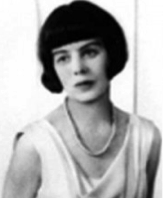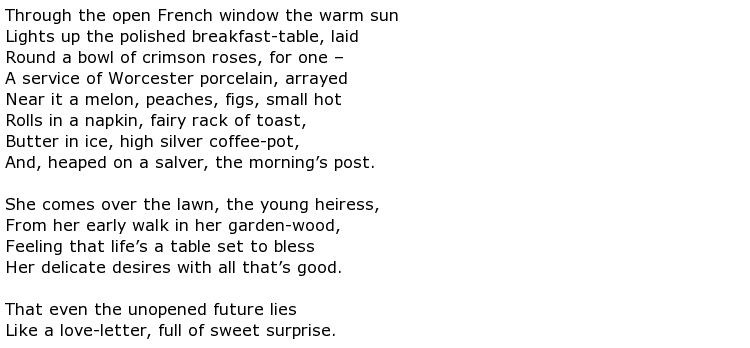 The English poet Elizabeth Daryush attracted a fair amount of criticism for the “proper” language that she used, and the style that she adopted, when writing her poems. She should not be blamed for it though as she grew up during Victorian and Edwardian times where it was perfectly normal for a young woman of her background to write in the way that she did. It is to her credit though that she was able to respond to her critics. It is very likely that she was influenced by her marriage to a man of middle eastern origin, and the subsequent four years that she spent in Persia. She changed her style radically and became a renowned 20th century poet.
The English poet Elizabeth Daryush attracted a fair amount of criticism for the “proper” language that she used, and the style that she adopted, when writing her poems. She should not be blamed for it though as she grew up during Victorian and Edwardian times where it was perfectly normal for a young woman of her background to write in the way that she did. It is to her credit though that she was able to respond to her critics. It is very likely that she was influenced by her marriage to a man of middle eastern origin, and the subsequent four years that she spent in Persia. She changed her style radically and became a renowned 20th century poet.
She was born Elizabeth Bridges in the village of Boar’s Hill, near Oxford on the 8th December 1887. Her father was another famous English poet, named Robert Bridges, who served as his country’s Poet Laureate for 17 years from 1913. Apart from four years in the middle east, Elizabeth would spend most of her life in Boar’s Hill. She grew up in a highly privileged environment and it seemed a natural progression for her to follow her father into a writing career. Her early work was published under the name Elizabeth Bridges while she was in her twenties and, in these carefree pre-war years, her poetry was described as being:

Like her father, Elizabeth used the “syllabic verse” style in her poetry, except that she took the concept further. An example of this style of writing was in her poem Accentedal which was written in the quaternion form. A famous critic Yvor Winters (also an accomplished poet) picked out another of her poems for special praise. He said that Still-Life was her most successful experimentation with syllabics. This poem was a startlingly accurate snapshot of the comfortable lifestyle that she, and others of similar background, was enjoying. Here is the poem:

Her marriage, while in her mid-thirties, to Ali Akbar Daryush, and the four years spent living in Persia, undoubtedly changed her outlook on life and she became very much aware of social injustices and the problems of those who had not grown up with her advantages. A striking example of this new vision was The Last Man, written in 1936. Gone were her earlier flowery phrases; no more could you find words such as “o’ers and ‘twixts and ‘tweens”, all written in “her very proper accent”.
She certainly endured more than her fair share of criticism for her earlier work though. One critic, perhaps unkindly, suggested that:

The work of Elizabeth Daryush has undoubtedly received mixed reviews, both during her lifetime and since her death in 1977. Some praised it for its highly technical values, especially her experimentation with syllabics. Others though recognised it as good poetry in its own right where the writer was able to deal with:

In summary though here are two contrasting views. The critic Donald Davie wrote an introduction to her Collected Poems and said that:

Another, Richard Ellmann, wrote:

Elizabeth Daryush died where she had spent most of her life, at Boar’s Hill, on the 7th April 1977. She was 89 years old.

